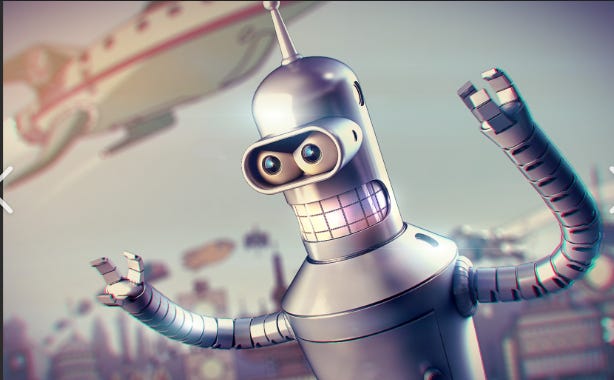"That's Progress!", pt. 1
An attempt to sparingly negotiate the deluge of largely frivolous technological development before it stops being frivolous and starts being an impediment.
“Man is obsolete!
Our world, obsolete!
Man is obsolete!
Erased; extinct!”- Fear Factory, Obsolete
“And now, since you are the father of writing, your affection for it has made you describe its effects as the opposite of what they really are. In fact, it will introduce forgetfulness into the soul of those who learn it: they will not practice using their memory because they will put their trust in writing, which is external and depends on signs that belong to others, instead of trying to remember from the inside, completely on their own. You have not discovered a potion for remembering, but for reminding; you provide your students with the appearance of wisdom, not with its reality. Your invention will enable them to hear many things without being properly taught, and they will imagine that they have come to know much while for the most part they will know nothing. And they will be difficult to get along with, since they will merely appear to be wise instead of really being so.”
- Socrates to Theuth, warning of an emerging new technology: books.
“I think it’s the end of civilization.”
- Peter Steele, speaking on the emergence of smartphones.
Back in the ‘70s and ‘80s, before choking hazards were a force to be reckoned with, Kinder Surprise eggs used to come with some really cool toys, and my dad used to collect them in an old cookie tin. These weren’t like the kitschy cheap plastic ones you might be familiar with; the ones with the stickers that were supposed to pass as decals for small planes and cars, but would fall off due to shortages of horses for the glue, I guess.
No, these were the real McCoy. They had small but elaborate gear networks and actual drivetrains. Some of the gears were made out of that sort of pewter-cum-metal, and the bodies were a decidedly more hearty plastic. Now, these little cars were the ones that could readily build up momentum and zoom with a surprising amount of torque with just a little propulsion. Without the propulsion, of course, it would just sit there.
So, you would run the wheels on whatever surface you were using twice or three times to build up the potential energy, and then, you would watch that mother just zip on its own, unknowing where, exactly, it would stop.
I’m using this as a metaphor for necessity being the mother of invention, and then the invention being the mother of itself, to an extent. A human hand is necessary to seeing the car go in the first place, but not to aid in its trajectory (there is the Law of Conservation of Energy, but it’s not conducive to my metaphor, so we’ll ignore it for now). Hypothetically, if the car keeps going, at what point does it stop being necessary for human input and just become an agent of its own consumption?
All right, so that’s a sort of awkward analog, but it’s the best I’ve got. And it’s a decidedly reductive one when applied to the progress of technology as a general rule. In many cases, one can make the case that we don’t “need” it, and its own supply justifies its own demand, which then justifies its own necessity. A luddite might have been right in saying that calculators would diminish the human capacity to inculcate processing, but an economist would also, rightly so, point out that human progress is not going to stop because we have spare time freed up by a device.
On the whole, I think technology is, obviously, a net-positive, being that I’m using more innovations than I can imagine just typing these sentences. But the artist in me, the one that’s concerned about a dwindling proliferation of humanity, can’t help but fret about whether the juice is actually worth the squeeze if we’re looking at it from any angle other than gross empirical output. I strongly suspect there’s a folly in being the foolish race that rushes in because technology is waving a shiny Bitcoin in our faces and compelling us to run for it, in spite of everything else, including our selves.
Reverse Improvement
First thing I want to declare is that none of this is definitive. It’s just a statement on the utility of advancing technology as I see it, so take that as you will.
My perception is that the march of technology is fueled in smaller part by human curiosity, and in larger part by enterprise. Much of what passes for advancement seems like supply creating its own demand in the form of corporations who were once on the cutting edge of innovation now just trying to meet quarterly budget projections. You’ll hear complaints about this in just about any industry slowly succumbing to the rubber legs of legacy, in particular gaming and smartphones.
In most cases, there comes a time where the field you’ve chosen to specialize in reaches a stalling, and can only be surpassed by access to the absolute finest resources to transcend it. But that costs. A lot.
But there’s a snag here: publicly-traded companies - you know, the ones always being milked for dividends by impatient shareholders - are kind of like the Running Man or the bus in Speed: they can’t stop for a single fiscal quarter lest they spell their own doom. Their only saving grace is the knowledge that there is a great swath of the public willing to spend even on the illusion of advancement.
So they add features that have seemingly limited or questionable utility compared to their backward-issue counterparts: higher resolution, increased picture definition, sound definition too refined for the human ear to even detect - and they do have utility and novelty, no question. But I’m always wondering how much of this would have been close to missed had they not been developed.
It Ain’t Broke. So Fix It.
Humans in large enough groups tend to be highly impressionable and lacking in anything resembling common scruples. Trending technology seems to warrant its own necessity among the populace. But that never seems to be enough. There always seems to be some implicit esteem that accompanies new developments, and a warrant to deride people who don’t hitch a ride on a bandwagon.
Here’s a good example: CDs. I love CDs, and I own thousands of them. And to date, I think they are the pinnacle of consumable music development. They are the only medium that is limited to single physical copies while being readily translated into data with simple ripping. Spinning a silver platter also has an implied limitation to it. You can stick one on, press play, and experience an album front to back.
So why is it people will deride you for still preferring CDs as a format? You can’t open a jewel case in sufficiently broad company without someone making some sort of backhanded comment about you not being ‘with it’, as though the technology no longer works or no longer has any merit whatsoever. That’s how ingrained the expectation to “keep up” has gotten: even if a development is still practical, consumption-conditioned people will assume you’re some sort of aberration just because you’re sticking to what works.
The move away from physical formats, I think, is a net negative development, at least on the supply side. On the one hand, it’s nice to have all your albums in a compact format that’s readily portable and can be transferred between your devices. But on the other hand, it was the Pandora’s Box that released the deluge of illegal downloading (to this day, you will still get knee-jerk reactions and weak rationalizations by people who have no problem with stealing music. That is, if they don’t give you a horse laugh first). The collapse of the edifice of record companies and market limitations also opened the door for exploitative streaming platforms to exert practical monopolies over music consumption. If you’re lucky, your craft will get thrown in with a soup of other music while you get remunerated to the tune of fractions of a penny per stream, not to mention being fodder for advertisers for all the people who don’t want to pay for a Spotify membership. The idea of being a salesperson for consumer products as a function of your own craft doesn’t seem like such a hot idea, I’m sure.
And once again, that kind of talk is readily dismissed as “fuddy-duddy” or old hat. “Get with the times!” Why? The times suck! The only difference is you have no idea why, just like someone who’s standing on the backs of a bunch of people and have no clue why it is they’re complaining.
Here’s a good example: one of Bill Maher’s New Rules segments focused on “reverse improvement”, which is the consequence of over-engineering that makes the user worse off. His old vape pen had a mouthpiece. His “upgraded model” does not. Which, as he said, is a mighty odd development for an instrument you have to stick in your mouth.

And some of these innovations are even a throwback. Buying vinyl - which is more expensive, considerably more fragile, uses up more material, and doesn’t have the benefit of doubling as a digital data source - is now en vogue amongst the younger crowd, many of whom are the selfsame that think you’re a relic because you like CDs. (Vinyl is its own tangent altogether, and I’ve already addressed it, so I won’t retread that swamp of an argument again).
Highly Instrumental
Musical instruments are another harrowing example. Unlike digital music consumption, though, I think it’s a net positive. It’s still a pain.
To try and keep it simple, for a long time, synthesizers were giant keyboards you paid a couple of grand for, but produced otherworldly sounds. The advent of laptops (and later tablets) promised a glowing future for music creation because now, you just had to get a controller (basically, a keyboard that doesn’t make sounds on its own) and some software. And you weren’t limited to on-board sounds. You had a whole market of programs at your disposal. Sounds like a solid deal, right?
Yeah, well, there wasn’t even fine print that came along with it, because what not even the developers could anticipate (I’m guessing) was the constant updating you would have to do just to keep your software functional with your operating system updates. I don’t think developers wanted a lifetime commitment to constantly update one time-purchase software all the while still having to develop new software. It may not even be worth it for a lot of people, too. I can’t tell you the number of times I’ve been at a show where it had to stop due to a technical difficulty with a laptop (and yes, it has happened to me).
Sure, you can’t really expand or customize (at least to anything other than a limited extent) your on-board sounds from a synthesizer, but at least it’s 100% reliable, provided the power doesn’t go out and the venue doesn’t burn down like what happened to Great White at The Station. Now that was a malfunction.
And by the way, sometimes the developer goes out of business, and now that wonderful software you paid for out of your own billfold becomes the dreaded abandonware, which gets obsoleted after enough system updates. So the musical instrument you bought just stops working one day, and not even from attrition or wear. I might have to tune my acoustic guitar from time to time, but at least I don’t ever have to wait twenty minutes to play it while it updates or worry that it will just never make a sound at all one day.

Besides: none of this really matters now that we’ve surpassed the AI singularity and musical craftsmanship doesn’t have any value at all because it’s indistinguishable from a bunch of commands I could just enter in.
More to Come…
There’s going to be a second part to this where I elaborate a little more seriously on the broader implications of the complacency to technology. That is, if we don’t pass Ray Kurzweil’s technology singularity node and my AI software companion doesn’t anticipate what I’m going to say and make the argument for me.
Zero-One-Zero-One-ZeroGrav,
03/03/25.




